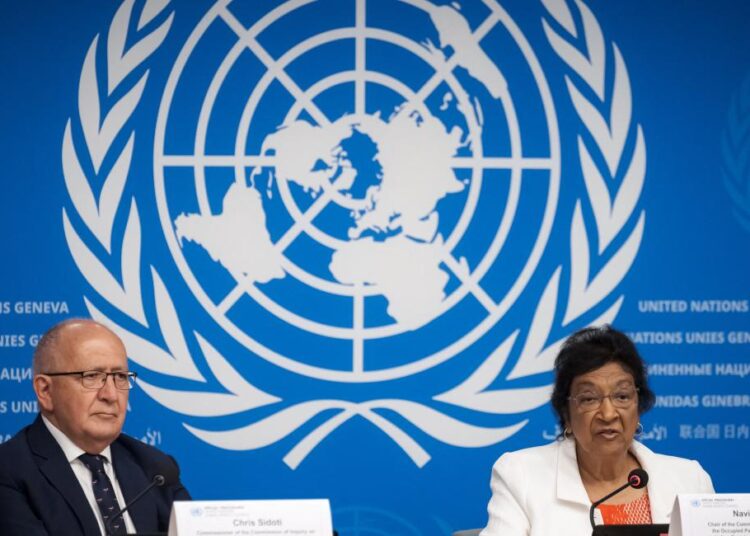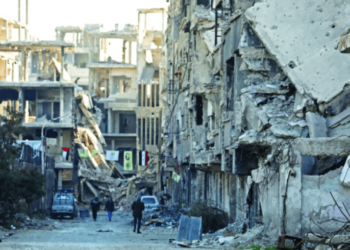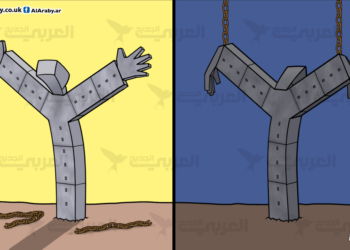The decision of the Independent International Commission of Inquiry, which found that Israel committed the crime of genocide against Palestinians in Gaza, represents a turning point in the condemnation of Israel under international law, with profound repercussions for it and its allied states. The comprehensive legal analysis submitted by the Commission in its report dated 16 September 2025 to the Human Rights Council establishes, through conclusive evidence, the Israeli authorities’ state responsibility for the commission of genocide under the Convention on the Prevention and Punishment of the Crime of Genocide. This conclusion represents a qualitative change in the legal obligations of third states, particularly those with diplomatic, military, and economic ties to Israel. The Commission’s conclusion that the acts of genocide were accompanied by a special intent (i.e., the specific intent to exterminate the Palestinians in Gaza as a group) raises a complex web of legal responsibilities under both treaty and customary law, which the Allied States can no longer ignore without risking legal liability.
Unlike previous UN findings that documented war crimes and crimes against humanity in Gaza, the report of the Independent International Commission of Inquiry provides a legal analysis under the Convention on the Prevention and Punishment of the Crime of Genocide, limited to the Gaza Strip between October 7, 2023, and July 31, 2025. Its scope is limited to the Gaza Strip, between October 7, 2023, and July 31, 2025. It aims to investigate state responsibility for genocide, not merely the acts constituting the crime or individual criminal responsibility. The commission applies its standard of proof (reasonable grounds for inference) to the factual record, and then (most importantly) concludes the existence of genocidal intent based on direct evidence from statements made by Israeli authorities and circumstantial evidence that makes this conclusion “the only reasonable inference” in light of the pattern of conduct. The commission determined that the Israeli authorities and security forces intended to destroy the Palestinian community in Gaza, in whole or in part. This conclusion represents a qualitative shift, as a UN investigative mechanism links the acts constituting the crime to a state-level finding that establishes specific intent and the resulting responsibility.
The timing and institutional position of the report are additionally significant. The commission explicitly aligns its analysis with the case filed by South Africa against Israel before the International Court of Justice, while affirming that the court is the body competent to make the final determination of state responsibility. Meanwhile, the commission, within its UN fact-finding mandate, is now assessing responsibility and detailing its consequences. Based on peremptory norms (jus cogens) and obligations erga omnes, the report is formulated to give effect to all States’ obligations under the Convention, regardless of their treaty status or political position. The report is a stimulating legal document that consolidates factual findings, details the specific intent of genocide, and activates the duties of remission, prevention, and punishment across the international system, pending the final ruling of the International Court of Justice.
The Legal Structure of Third-Party Obligations
The Commission’s findings establish a comprehensive framework of legal obligations binding on all states, rooted in the Genocide Convention and customary international law. The report affirms that the prohibition of genocide constitutes a peremptory norm of general international law, generating obligations vis-à-vis all that go beyond traditional treaty relations. All States, regardless of their treaty status, are thus obliged to prevent and punish genocide wherever it occurs. The Committee explicitly recalls the recognition by the International Court of Justice in the Barcelona Traction case that the prevention and punishment of genocide constitutes an obligation upon the international community as a whole.
The duty to prevent genocide, according to the Commission’s analysis, crystallizes from the moment a State knows, or should normally have known, that there is a grave risk of genocide. The Commission asserted that this threshold was unambiguously established on January 26, 2024, when the International Court of Justice issued its first order for provisional measures in the South Africa v. Israel case, establishing the plausibility of the claim of genocide. In the author’s view, this moment represents a watershed moment in time, demonstrating that all states have been structurally aware of the grave threat for over a year and a half, and during this time, the obligation to use all reasonable means available to prevent genocide has persisted, a duty that many states have failed to fulfill.
The author notes that the Committee’s analysis relied heavily on the jurisprudence of the International Court of Justice in Bosnia v. Serbia, which held that a state may bear responsibility if it manifestly failed to take all feasible measures to prevent genocide when such failure was within its power and its taking could reasonably have contributed to prevention. This standard places a heavy burden on states with significant influence over Israel, including states that provide it with military, economic, or diplomatic support. Accordingly, the Commission concluded that the ability to influence the behavior of the perpetrator state becomes a decisive factor in assessing a third state’s compliance with its preventive obligations. The broader the channels of influence (through arms supplies, commercial dependence, or political alliances), the greater the responsibility to use those channels to prevent the continuation of genocidal acts.
Legal Implications for Allied States
The Commission’s findings impose concrete obligations on Israel’s allies that go far beyond purely diplomatic considerations. The report explicitly states that states must cease transfers of arms and other equipment, including jet fuel, to Israel whenever there are reasonable grounds to believe that they are being used in military operations involving genocide. This obligation is not contingent upon evidence beyond reasonable doubt, but rather upon the establishment of reasonable suspicion. Given the Commission’s conclusive findings regarding the ongoing genocidal activities, the continued transfer of arms by allied states constitutes a violation of their obligations under the Genocide Convention and may amount to complicity in genocide.
Another important, and less discussed, finding is that the principle of non-recognition of situations arising from serious violations of “jus cogens” requires states to refrain from recognizing the legitimacy of any situation resulting from a violation of those rules. The Commission specifically called for non-recognition of the legitimacy of the military operations in Gaza, which resulted in violations of those “jus cogens,” including genocide. This poses significant challenges for states that publicly supported Israel’s military operations as legitimate acts of self-defense. The Commission’s findings effectively invalidate any legal basis for such support, as genocide cannot be justified on the grounds of self-defense or military necessity.
The Commission also recognized that States must ensure that individuals and corporations under their jurisdiction do not engage in or assist in the commission of genocide. This creates broad obligations for allied States to investigate and, where appropriate, prosecute their nationals and incorporated entities that may have contributed to genocide (through arms sales, intelligence sharing, or other forms of material support). The Commission emphasized the need to facilitate domestic investigations and judicial proceedings against the State of Israel and individuals or corporations implicated in or facilitating the commission of genocide.
The obligation to cooperate with international accountability mechanisms represents another crucial dimension of third-party states’ responsibilities. The Committee explicitly recommends that states cooperate with the Office of the Prosecutor of the International Criminal Court (ICC) in its investigations into the situation in the State of Palestine. For states that have consistently shielded Israel from international accountability through veto power or diplomatic pressure, this obligation requires a radical shift in policy. The Committee also recommends that states intervene in the International Court of Justice proceedings initiated by South Africa, emphasizing that passive observation is not sufficient when it comes to the crime of genocide.
Direct Legal Implications for Israel (Beyond the Obligations of Third States)
The Independent International Commission of Inquiry devotes a section to Israel and to the consequences arising under the Convention on the Prevention and Punishment of the Crime of Genocide and under the rules of State responsibility. As a party to the Convention, Israel is obligated not to commit or incite genocide, and to prevent and punish its perpetrators. State responsibility is borne by the actions of any governmental body, including political leaders, armed forces, or specific units, and does not depend on prior individual criminal convictions.
These commitments are reinforced by two salient features of the record. First, the Commission’s assessment highlights a pattern of behavior that includes widespread killing, starvation and siege tactics, systematic obstruction of humanitarian aid, attacks on the health system, and the direct targeting of children—a pattern from which an intent to destroy the group’s current and future biological viability can be deduced. A State found responsible for such conduct is obligated to promptly end policies and operations that constitute these forms of genocide (such as blockades, denial of aid, targeting of medical infrastructure, and reproductive and gender-based violence), and to adopt effective guarantees of non-recurrence.
Second, the commission finds that the statements of senior officials amount to direct and public incitement to commit genocide, an act punishable independently under Article 3(c). This compounds Israel’s duty to punish through genuine investigations and prosecutions, and to suppress any subsequent incitement by state bodies. The legal challenge here arises from two interrelated dimensions: (a) the state’s responsibility for the failure to prevent and punish, and (b) the increased risk of individual criminal accountability before competent bodies (including the International Criminal Court), noting that the commission’s report does not establish individual guilt.
In practice, there are immediate consequences for Israel. Based on the Committee’s formulation, Israel must: cease the conduct it determines falls within the scope of Articles 2 (a) and (d) of the Convention, and eliminate the leadership policies and practices that underlie such conduct; investigate, prosecute, and punish the relevant agencies and officials; and cooperate with international mechanisms and judicial proceedings in accordance with its obligations under the Convention and international law. The Committee’s conclusion that State agencies have committed acts of genocide under a central authority, and in the absence of genuine national accountability, further strengthens the legal imperative to take these measures without delay.
Conclusions
The commission’s finding that Israel committed genocide in Gaza significantly reshapes the legal and moral landscape for Israel’s allies, transforming what many considered political options into binding legal obligations under international law. The comprehensiveness of the commission’s findings (establishing criminal intent and specific genocidal intent), documenting direct and public incitement to genocide by senior Israeli officials, and demonstrating Israel’s failure to prevent or punish these crimes (leave no room for ambiguity regarding the gravity of the situation or the responsibilities of third states). The report demonstrates that the duty to prevent genocide is a concrete legal obligation, the violation of which may lead to a state’s responsibility for complicity in genocide. The commission’s reference to jus cogens confirms that these duties transcend political alliances and bilateral relations and represent obligations vis-à-vis the international community as a whole and humanity as a whole. For Israel’s allies, the commission’s findings represent a diplomatic challenge and a legal imperative requiring the immediate cessation of all forms of support that could contribute to the continuation of genocidal acts, and the adoption of positive steps to prevent further atrocities and ensure accountability. Failure to comply with these obligations, particularly in light of the clear warning provided by the commission’s findings and the ICJ’s provisional measures, would constitute not only a breach of international law but also potential criminal complicity in the most serious crime known to humankind.






